OUR NEWS. OUR CULTURE. OUR TIME.


OUR NEWS. OUR CULTURE. OUR TIME.





content in written and pictorial form in both print and online mediums and is a work of art everyone will be proud to display.
Established in 2022 and published quarterly by communications and media executives Stephanie Bass Jackson and Myron Jackson through Jackson and Jackson Publishing, LLC, NOIRE® brings us stories of triumph, heartache, celebration, grief, hope, and aspiration, and always leaves us wanting more. Each issue, NOIRE® features content that’s hot and relevant for the culture, of course. And we always keep the content fresh, thought-provoking, and exciting at NOIRE. This is our news, our culture, our time.
Find us at NOIREArkansas.com and on Facebook, Instagram, and X (formerly Twitter) @ArkansasNOIRE


To unapologetically share the beauty and rich heritage of amazingly diverse Black Arkansans and to better foster cooperative and collective advancement of the people.
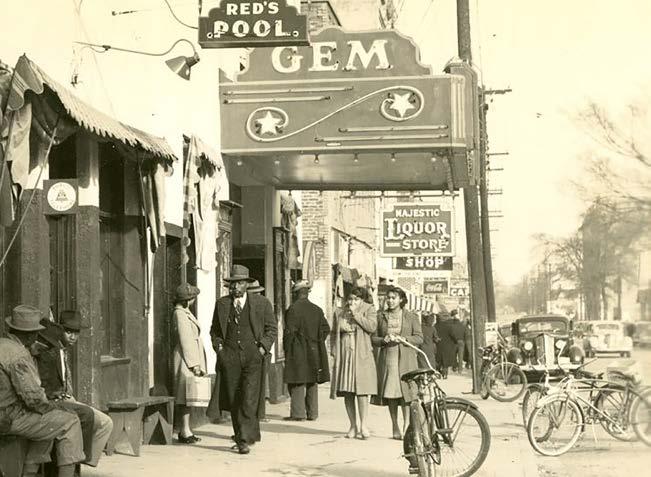
a deeper collective love and appreciation for the contributions of Black Arkansans to the culture of Arkansas.

Kimberly Hunt’s path from Lonoke to Washington is a story of resilience, purpose, and boldness. Her work in politics is about more than campaigns—it’s about empowering communities and shaping the future. By Stephanie Bass Jackson
With her Arkansas roots, Fatima Robinson is firmly planted in the entertainment industry as a prolific dancer, choreographer, director, and Emmy-nominated producer. By Sericia Nelson | Photography by Andreas Neumann
As the opioid epidemic picks up, a family shares how fentanyl has made a permanent hole in their lives. By L. Lamor Williams
From West Helena to UAPB and on to NASA’s Marshall Space Center, Dr. Ruth Jones is in an orbit of her own. By Ann White-Taylor


Getting to know YOUrself through substantive information, illuminating insights, and meaningful experiences.
Faith and destiny moved Katie Branch to bring Pine Bluff its first free-standing Chick-fil-A restaurant. By Katrina Dupins | Photography by K & C Media 16 kNOw You.
Exploring the nuances of African American culture by highlighting the diverse narratives, concerns, aspirations, and accomplishments that make us uniquely US.
Executive Editor Sericia Nelson on the power that lies within. 30 kNOw Better.
Stephanie and Myron Jackson on the publishing journey.
Knowing and understanding our community’s struggle strengthens our identity and empowers collective action.

Founders / Publishers
Stephanie Bass Jackson
Myron Jackson
Executive Editor
Sericia Nelson
Creative Director
Myron Jackson
Producer
Jasmine Blunt
Issue Contributors
Tanisha Joe-Conway
Katrina Dupins
Reginald James
Dr. Karama Neal
Nyah Peyton
Dr. Ann White-Taylor
Jurnee Taylor
L. Lamor Williams
Issue Photographers
Andreas Neumann, CoriCreated, K & C Media, R.A. Howard, Sarah Oden, Simeon Norfleet, Tristan Jermany
Vol. 001, Number 002
NOIRE Magazine is published quarterly by Jackson & Jackson Publishing, LLC
Copyright 2024 NOIRE
All Rights Reserved. Printed in the USA
400 W. Capitol Ave., Suite 1802 Little Rock, AR 72201
Cover and contents may not be reproduced or reprinted in any form or medium without prior written permission. While effort has been made to verify the accuracy of information presented in this issue, neither NOIRE nor its staff is responsible for omissions or information that has been misrepresented to the magazine.
Phone : 501.492.4900 | Fax: 501.492.4905
Mail: 400 West Capitol Suite 1802, Little Rock, AR 72201
Publisher: sjackson@arkansasnoire.com
Sales: mjackson@arkansasnoire.com
Editor: snelson@arkansasnoire.com





is the public relations director for the Sells Agency in Little Rock. A Pine Bluff native, he spent nearly two decades in newspaper journalism, working in the Black press for such publications as the Dallas Weekly and Dallas Examiner, as well as mainstream outlets Arkansas DemocratGazette and the Fort Worth Star-Telegram. He’s the first Black male to be president of the Arkansas Public Relations Society of America chapter, a cum laude graduate of Philander Smith University, and holds the Accredited in Public Relations designation from PRSA.

is an author, professional poet, and executive operations coordinator for The Office of Mayor Frank D. Scott, Jr. As a UA Little Rock undergraduate, Nyah wrote and performed awardwinning poetry and had the opportunity to produce content for acclaimed author and speaker Luvvie Ajayi Jones. Now with her Bachelor of Business Administration in Marketing, the proud member of Delta Sigma Theta Sorority, Inc., makes her NOIRE debut as a contributing writer.
was born and raised in Little Rock. An anchor and reporter for THV11 News, she covers a range of interesting, newsworthy topics and human interest stories. She’s a staunch alumna of Little Rock Central High School, studied journalism at The University of Memphis, and is an active member of Alpha Kappa Alpha Sorority, Inc. Invested in good storytelling, for this issue Jurnee writes about a mother’s quest to reconcile her son’s suicide by educating others about the importance of mental health.

German-born Andreas Neumann is a renowned photographer whose work is influenced by Ansel Adams and Caravaggio. He’s famed for capturing high-contrast, timeless images and has photographed celebrities like Pelé and Iggy Pop. Neumann authored “Lucha: A Tribute” and co-directed “American Valhalla,” a documentary about Iggy Pop. A 2020 Grammy Award winner for his photography on Desert Sessions Volume 11 & 12, Andreas was behind the beautiful photographs of our acclaimed cover star, Fatima Robinson.

is a professional communicator and former journalist who enjoys writing about people whose circumstances have offered unique and inspiring perspectives. She loves quiet mornings with a hot cup of coffee and spending time with her husband and two children. In this issue, it was her pleasure to dip her pen in ink for a profile of Arkansas’s first Black woman Chick-fil-A franchisee in “Smooth Operator” (page 56).





As I write this letter, reflecting on the journey of publishing NOIRE®, I am struck by the blend of challenges and triumphs that define this industry. In an era when attention spans are shrinking and the allure of digital media casts a long shadow, crafting a print publication brimming with compelling stories can feel like swimming against a current. Yet, Myron and I have a deep sense of purpose—a commitment to delivering narratives that resonate and endure.
Since our inaugural issue in November 2023, a great deal has unfolded both within the pages of our magazine and beyond. Personally, it has been a year of profound milestones. Our daughter’s graduation from law school marked a culmination of dedication and ambition—a moment of immense pride and joy for our family. Meanwhile, the arrival of our editor’s grandson heralded new beginnings, infusing our team with the vitality of the next generation. And nature itself provided an awe-inspiring spectacle with the celestial dance of a total solar eclipse, a reminder of the vast wonders that unfold beyond our daily concerns.

In this latest issue, we are honored to feature THE Fatima Robinson—a powerhouse in the world of choreography—as our cover star and cover story. Robinson’s influence on dance and culture is profound, and her journey serves as a testament to the transformative power of art. Her creative vision has graced the biggest stages and screens with
the biggest performers, including Beyonce, Michael Jackson, and in the reimagined classic “The Color Purple.” We are privileged to delve into her story and the inspirations that have fueled her illustrious career.
The process of curating each issue of our magazine is a labor of love. Our team is in constant search of narratives that are not just noteworthy but essential—stories that inform and captivate. It’s a delicate balance of artistry and strategy, of staying true to our vision while being in tune to your tastes and interests.
And there’s a unique joy in knowing that, despite the odds, our words and images find their way into the hands of readers.

In a landscape where “instant” is the norm, we embrace the enduring appeal of print—the tangible, tactile experience that invites slow, intentional consumption. It’s a reminder that quality endures and that the best stories are timeless.
Of course, none of this would be possible without you, our readers—the heartbeat of our publication. Your engagement with NOIRE fuels our creativity and pushes us to raise the bar with each issue. So, just as you did with the first issue, immerse yourselves in this one. We hope you are moved by the stories we’ve assembled and discover moments of connection and insight that transcend the daily noise.
With gratitude and anticipation, Stephanie Jackson and Myron Jackson
From fivefourfred
This is SOOOOOO DOPE!

NOIRE … is an absolute sensation, and I’m thrilled to be a part of it! NOIRE shares incredible stories of those making a difference in our Arkansas community and beyond. From JimmyWarren
From Quantia Mills Fletcher
Lordy, lordy. The. Vibe. Dripping in Culture. Iconic and groundbreaking rhythm. Congratulations!
From kortomomolu
The @arkansasnoire drop is pure Fire!
Cheers to an allstar team!
From Antwan Phillips
Finally got a chance to read the premiere issue of NOIRE and I love it- especially the mission and vision of unapologetic appreciation of black people in Arkansas. Salute to Stephanie Jackson and Myron Jackson for a job well done.
Arkansas NOIRE means that people will know the stories, struggles, and successes of people who look like them! This is major and I am excited once again to read and celebrate! From Laura Webster Martin
From Frank D. Scott Jr.
NOIRE IS
From coleashyreelong
Coffee table staple!!!! So excited for y’all!!!
From Mytbydesign
Received our 1 st issue of NOIRE magazine in the mail today at the studio. The way they beautifully painted our Arkansas black stories throught the magazine is phenomenal There are several NWA Black owned business leaders highlighted as well.
From ommaaa congratulations!! beautiful work!!
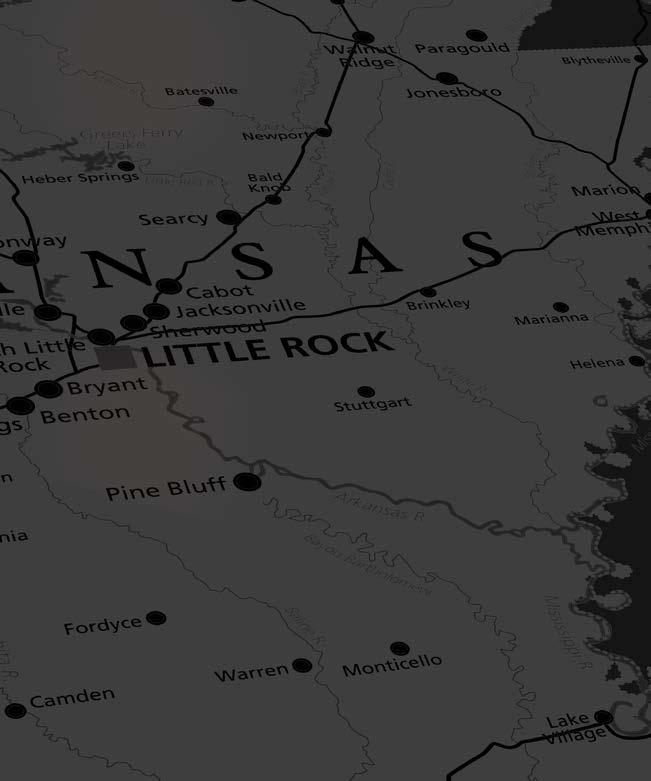
From ccmercertoo
Yo! Can’t wait!!! We NEED this!
From majestic1981
This content is ! Congrats!!”
From Ken-Matt Martin
There’s no place like home. Hope you’re ready for some art in Little Rock. Thank you NOIRE for featuring me in your inaugural issue.
The vision to inspire all to a deeper collective love and appreciation for the contributions of Black Arkansans to the culture is AMAZING. From Tionna Jenkins
From KeyaPatrice
Absolutely loved the first issue. Looking forward to the next. AMAZING work!!


I“

stare at them every day – these words of Harriet Tubman:
Every great dream begins with a dreamer. Always remember, you have within you the strength, the patience, and the passion to reach for the stars to change the world.”
This powerful quote – emblazoned on a wall plaque in my office – is an anthem of sorts for the NOIRE team. As we endeavor to bring each issue to life, Tubman’s words underscore how excited we are to celebrate and amplify the voices, stories, and experiences of African Americans in Arkansas. It is a privilege to showcase the indomitable spirit within each of us, reminding ourselves that no matter the challenges we face, we have the strength, patience, and passion to overcome; assured that our collective dreams can transform not only our own lives but also our communities and the world.
This publication is proof positive, reflected by an array of stories embodying this spirit of dreaming and doing. From local entrepreneurs breaking new ground to artists and activists who capture the essence of our culture, each narrative is a testament to the power of perseverance and vision. We’ve brought a spotlight to those who are making significant impacts, proving that greatness is within grasp and possibilities are simply waiting to be realized.
One such example is our cover star, Arkansas native Fatima Robinson, who wowed us with the waltz and arc of her career which has taken her from dancing in clubs to choreographing music videos to global acclaim. Fatima’s journey is a powerful illustration of Harriet Tubman’s prophecy. Starting with a dream and nurtured by her native roots, she has gracefully plotted moves to become a bonafide star – and been just as intentional about staying centered and grounded along the way. We can all learn from Fatima’s unwavering belief in herself and be inspired by her ability to make her dreams come true.
Truth be told, all around us are everyday dreamers whose quiet resilience and relentless pursuit of excellence continue to shape our future. Greatness is knitted inside each of us. So, whether it’s nurturing a new idea, championing a cause, or simply striving to be your best self, remember that you have the power. Your actions, no matter how small, can make a significant difference between sleeping on your dreams or dreaming and making things happen.
Speaking of making a difference, please accept my heartfelt thanks for being the best part of NOIRE. Your thunderous support for our debut gave us the push to keep dreaming, digging, and doing, and it also reaffirmed the importance of our vision. We’re resolved to continue to uplift, empower, and celebrate one another, fueled by strength, patience, and passion to keep reaching for the stars.
ForwardGO!

Sericia Nelson Executive Editor
Greatness is knitted inside each of us. So, whether it’s nurturing a new idea, championing a cause, or simply striving to be your best self, remember that you have the power. ” “



Getting to know YOUrself through substantive information, illuminating insights, and meaningful experiences.

WELLNESS: EDEN SALT & YOGA STUDIO
HEALTH: HEART MATTERS
BEAUTY: A BLACK WOMAN'S JOURNEY WITH HAIR LOSS TAKE ACTION: GET LOUD ARKANSAS FROM SMALL-TOWN ARKANSAN TO POLITICAL POWERHOUSE A MORE PERFECT UNION

BY NYAH PEYTON PHOTOGRAPHY BY SARAH ODEN

Coming from a family of medical doctors, Tori Jones has gone against the grain to focus on wellness from another angle. But this wasn’t always the plan.
After attending Emory University, Jones attended law school at Georgetown University.
What the Indianapolis native didn’t anticipate was how much she wouldn’t enjoy it – and the accompanying feeling that she wasn’t very good at it. Despite her anguish, she stuck it out and graduated after three years, passed the bar exam, and started practicing law. However, after several less-than-comfortable incidents, and being without a support system in Washington, DC, she opted to move closer to family. Law school in the nation’s capital did allow for one bright spot: Jones stumbled upon a passion for yoga and yoga instruction.
After relocating to Arkansas, she had difficulty finding the work she wanted at a law firm. This concrete ceiling is what prompted her to step out on faith in 2019. Deciding to invest in herself and her passions, a few months before the pandemic, Jones opened the doors of Eden Yoga & Salt Studio in Little Rock to offer a variety of healing and wellness services, including sauna treatments, yoga classes, massages by appointment, and – its bread and butter – salt therapy, which Jones describes as being like “taking a vitamin.”
Eden Yoga & Salt Studio
Open Sunday-Saturday | Check website for hours (501) 563-3683 www.edensaltstudio.com
15400 Chenal Parkway, Suite 160 Little Rock, AR 72211
FB: Eden Yoga & Salt Studio
IG: edensaltstudio
Salt therapy is a wellness treatment that mainly targets respiratory conditions, skin conditions, and allergy symptoms. It’s antibacterial and anti-inflammatory,” explained Jones. It’s also great for boosting overall immunity and de-stressing.
In just a short time, Eden has attracted a broad client base.
“Our demographic is diverse! We mostly service clients who live in the area and the studio is convenient for them. We also reach people who are drawn to us because we are Black-owned and have staff that is not your ‘stereotypical yogi’ when it comes to race, size and age.”
Jones believes our bodies should feel like a temple. But while her foray into owning a yoga studio may not have been her first goal, as yoga teaches, she’s learned to find her flow. “With change, you just have to go [into it] with an open heart and an open mind. You have to believe that change is possible,” Jones said.
Equally as important as the business she’s building is the family she and her husband, Leon Jones, whom she met and married in Little Rock, have created. Together they share four children ranging in age from 21 to 18 months.
Jones believes in balancing her professional and personal goals so that one doesn’t tilt the scale away from the other. As a business owner, she wants her clients to feel their best, both physically and spiritually. For herself, she wants to find joy and bask in it. And as a mother, she is careful to set an example for her children.
“I want [them] to see that they can absolutely do [anything]; that they can change, that they can make mistakes, that they can be creative – all of the things I’ve learned about myself through running this business.”


IT TAKES CONSISTENCY AND DISCIPLINE TO KEEP INVESTING IN YOUR OVERALL WELLNESS. “ “ TORI JONES
Dr. Stephen T. Broughton
“ “
Cardiovascular disease is the #1 cause of death in the country, and it disproportionately affects Black and Brown people, especially in the South.
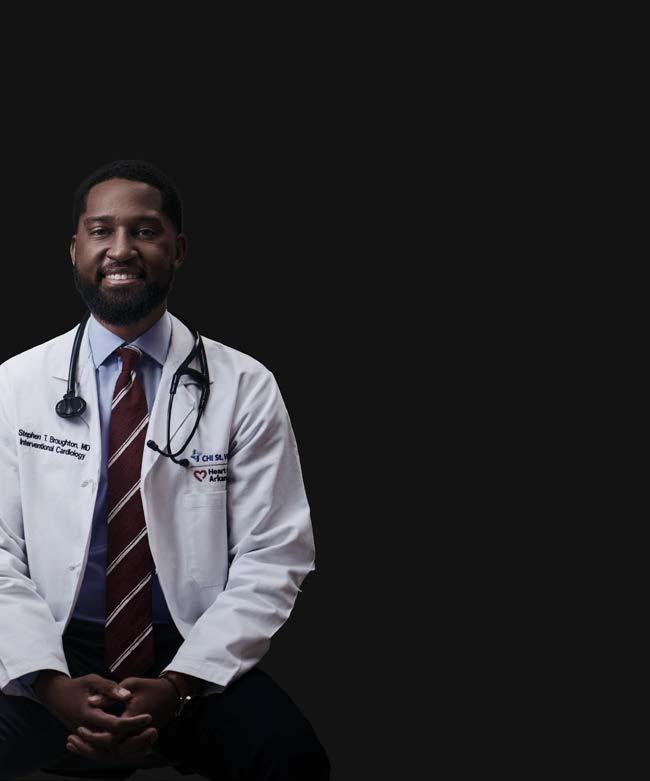
BY NYAH PEYTON
At the start of his collegiate career at the University of Arkansas at Pine Bluff, Dr. Stephen T. Broughton aimed to become an engineer, but he took a decidedly different turn. From UAPB to an internal medicine residency at Wake Forest Baptist Medical Center in Winston-Salem, North Carolina, then on to the University of Pittsburgh Medical Center for his cardiology fellowship, Dr. Broughton has carved a path to provide greater access to cardiology services in Arkansas.
Newly named to lead the satellite CHI St. Vincent Heart Clinic-Pine Bluff, Dr. Broughton brings his expertise back to his hometown to ensure that the underserved region receives the highest standard of cardiac care. We caught up with him, however, at his practice within the CHI St. Vincent Heart Institute in Little Rock to hear how his passion for medicine is transforming lives, one beat at a time.
NOIRE: You studied at the University of Arkansas for Medical Sciences (UAMS). Why did you choose cardiology as a specialty?
Dr. Broughton: When I got to medical school, I did a lot of bookwork for the first two years. Cardiology was one of the areas that was most interesting to me and seemed to be the most challenging. I liked how the cardiovascular system impacted every other organ system and was all-encompassing of the roles of a medical doctor. Also, cardiovascular disease is the #1 cause of death in the country, and it disproportionately affects Black and Brown people, especially in the South.
NOIRE: Why is it that cardiovascular disease disproportionately affects Black and Brown people?
Dr. Broughton: We were taught that if you’re of a certain background, ethnicity, or race then you’re going to be at higher risk. The question is why? It’s not just in our genes. However, some things affect us differently because of socioeconomic factors. People’s access to healthcare, getting seen by a physician, access to transportation, household income, environmental conditions, and hazards, healthy resources, and access to healthy food – all these factors increase your risk of developing heart disease and other diseases. Historically, Black people have a general distrust of healthcare and healthcare providers. We need to increase the amount of Black and Brown people in the healthcare field because being able to relate to your patients can go a long way.
NOIRE: What are some of the preventative actions that people can take to keep check of their heart health?
Dr. Broughton: I would say that some of the best things that you can do is establish care with a primary care physician. That’s a good way to start the initial screening of your health. The screening process helps us treat a lot of chronic diseases by catching them early. Also, it’s important to know your family history.
NOIRE: Who are the patients you are seeing in the clinics where you practice?
Dr. Broughton: We see anyone who wants to see a general cardiologist. So, if you’re having any concerns about your heart, chest pain, shortness of breath, concern about a family history of heart disease, or you have heart disease and you want to establish care with a new cardiologist – we see it all. I see patients anywhere from 18 years old to those in their 90s.
NOIRE: Overall, what seems to be the primary concerns of your patients?
Dr. Broughton: One of the biggest concerns of patients is their medications. We try to make sure they understand everything as much as possible. If they have questions, we encourage them to ask, and we make sure to ask questions ourselves to understand them better.
NOIRE: What would you personally desire to see in the realm of cardiology?
Dr. Broughton: I would like to see more Black people in a lot of the major trials in either cardiovascular education or cardiovascular procedural devices.

NOIRE: What does the future hold for your cardiology career?
Dr. Broughton: I know that I want to be impactful in my community and I want to leave a legacy like the people working around me. I want to, obviously, be a great cardiologist who provides great care to my patients, someone who makes a difference, doing things to advance the field of cardiology and expanding it in Arkansas.
“ “
I KNOW THAT I WANT TO BE IMPACTFUL IN MY COMMUNITY AND I WANT TO LEAVE A LEGACY...
DR. STEPHEN T. BROUGHTON



BY STEPHANIE BASS JACKSON
Our hair holds profound significance—it’s more than just strands. It’s a testament to our identity, culture, and confidence.
As a Black woman in my mid-40s, my hair loss journey has been complex and transformative. Ten years ago, I was diagnosed with Central Centrifugal Cicatricial Alopecia (CCCA), a condition that disproportionately affects women of African descent.
As a form of scarring alopecia, CCCA manifests as gradual hair loss radiating outward from the center of the scalp. Its causes are multifaceted, ranging from genetics to styling practices, and its impact extends far beyond physical appearance. For me, it marked the beginning of a journey to redefine my relationship with my hair and, ultimately, what hair means to me.
I remember telling my mom about the scalp biopsy I’d had done. When she asked if I had experienced extreme itchiness before the hair loss, I replied ‘yes,’ realizing that she, too, must have dealt with this. I wanted to shout, “Why didn’t you tell me!” Instead, I listened to her advice on how to treat it. Despite any hair loss issues, my mom retained most of her long, beautiful hair. Unlike me, however, she had never had a relaxer, worn braids, or experimented with other styling techniques that, while fierce, can be known to wreak havoc on Black hair.vSince I’ve noticed some thinning, my shift in styling—no more braids and no more bleach blonde—along with oral and topical treatments from my dermatologist, are helping slow down the CCCA sprawl, as I call it.
As a young woman, I had the mantra of “YOLO” (you only live once) when it came to hair. I tried everything: slick backs, tall and stacked ponytails, lots of color, finger waves, sew-in weaves, cornrows, and box braids. The stuff I did to my hair to express
my creativity is unmatched. I was the go-to person at church camps if you wanted a new ‘do. One year, my friend Patience and I turned the COGIC summer camp on the campus of the University of Arkansas at Pine Bluff into a pop-up beauty shop. She’s now a highly sought-after haircare artist and stylist in Nashville, Tennessee.
Meanwhile, seeing a doctor in my thirties for hair loss felt like punishment. I was ashamed of what could happen and ashamed of what had happened—at least two decades of experimentation was now coming back to haunt me. Hair, as many women have felt at one time or another, is often how one is judged. Being described as beautiful, for many, is equated with having a healthy head of long, kinky, or straight hair.
If I dare to be honest, as I approach a milestone birthday, I’m still bothered by my circumstances. While I’ve let go of the relaxers and have shifted from weaves to wigs, what’s happening to my hair is not well with my soul. One positive outcome of the CCCA diagnosis is the relationship to hair that I present to my daughter. I’ve already told her what’s going on with me and urged her not to wait to seek the medical advice of a dermatologist.
When India Arie sings, “I am not my hair,” I know she is right. But my truth is, if there were a treatment to bring it all back, I’d jump at reclaiming my crown of glory.

As NOIRE continues exploring Black women’s relationship with hair, we’d love to hear from you. If you have a similar story about a hair loss journey or a transformation you’ve experienced with your hair, you’re encouraged to email our editor at snelson@arkansasnoire. com. Let’s keep the conversation going.


WE GET WHAT WE GET AND WHOM WE ELECT BY DEFAULT
–
BECAUSE WE DON’T VOTE.
“ “
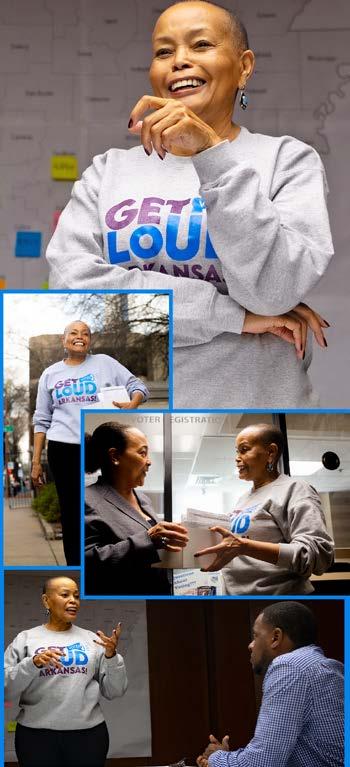
BY SERICIA NELSON
On a frigid morning in December 2021, a spark ignited—a promise of change, of progress. It was the start of Get Loud Arkansas (GLA), a nonprofit civic engagement organization on a mission to combat voter suppression, register new voters, engage low-turnout voters, and mobilize communities to harness the power of their vote to shape the future of Arkansas.
Get Loud Arkansas is founded by Joyce Elliott, a well-known figure with two decades of experience as a legislator in the Arkansas General Assembly. In a state ranked last for voting in the 50 states and the District of Columbia, with only 54% of eligible voters participating in 2020 and approximately 33% not even registered, the veteran politico recognized that the urgency was palpable. “The time was right because there was no reason to wait for engagement to worsen, which it was doomed to do. For me to do nothing seemed indefensibly negligent, a privilege that none of us should dare exercise,” she says.
“GLA consistently urges voters to learn about and engage at the most local of levels, from participating in neighborhood associations, committees/commissions, school boards, city and county governments, etc., not just state and federal. We strive to teach how to access elected officials, find information about meetings, participate in hearings, and generally build advocacy skills. We are determined to help make sure folks know and understand the full spectrum of civic engagement.”
Though small in size, the organization is making an impact. Since its inception, the team of four full-time staff and four parttime staff has been busy registering 6,471 voters across 72 counties. Through a multifaceted approach utilizing in-person events, canvassing, Zoom meetings, text banking, social media, and more, GLA not only registers voters but educates them about the entire voting process—from finding polling sites to understanding ballot issues.
One of its innovative strategies involves reaching out to young voters through technology, making voter registration more accessible and engaging. GLA’s online platform allows for the electronic completion and signing of voter registration applications, streamlining the process and reaching large numbers of young Arkansans. The team has been submitting electronically signed
registration applications to county clerks since October 2023. The organization is additionally focused on fostering meaningful conversations with young people.
“GLA also goes to high schools registering eligible juniors and seniors. Beyond registration, most students have questions and curiosities, especially about the voting process and about issues they care about— and they do care! GLA approaches young with respect, without lecturing or judging. We listen. And they talk with us.”
Get Loud’s recent focus on voter protection initiatives highlights the obstacles facing voters in Arkansas and nationwide, with Elliott asserting that “voting should be easy and convenient. For far too many eligible Arkansans, that is not the reality.”
As the November elections approach, Elliott is clear that Arkansans must go to the polls. “When you fail to vote your power, other people get to use your power and decide for you. When you don’t do politics, politics will do you, every time.”
The former classroom teacher turned political force isn’t oblivious to the rancor of politics (“So much of [it] has devolved to a state of being that’s just beneath what we should be”), acknowledging that it can be downright exhausting. Nevertheless, whether it’s ramping up GLA’s capacity or preaching the power of the vote, Elliott won’t stop fighting the good fight.
“I don’t think I should ever exercise the privilege of just quitting. People’s lives are more important than my inconvenience.”
To kNOw more, visit:
BY STEPHANIE BASS JACKSON
July 21 radically changed my summer plans and this issue. It’s the second time that a major event has caused the editorial team to pause and consider the moment and how NOIRE should document it. So, when President Joe Biden ended his bid for a second term as president and endorsed Vice President Kamala Harris, Myron, Sericia and I knew this was a moment we couldn’t miss. Arkansans, just like the Democrats from around the nation, would be shifting their votes and aligning with a new candidate for president of their party. And I knew I could not miss the historic convention in August where she would accept the party’s nomination. This was not just a milestone for Vice President Harris. It was a victory for all of the people of color fighting for recognition, representation and justice.
Pride and Joy Kamala Harris, the first Black woman and South Asian person to be nominated for the presidency by a major political party, stands
on the shoulders of giants who paved the way for this historic achievement. The day she made her acceptance speech, I was humbled to render the Star Spangled Banner at the morning Women’s Caucus meeting. It was at the request of the chair, Little Rock’s former Mayor Lottie Shackelford. During that meeting, we weighed the significance as we paid homage to Shirley Chisholm, who in 1972 became the first Black woman to run for president. Chisholm’s campaign was a groundbreaking moment in American politics—her guts and determination on display. She shattered barriers as a Congresswoman and paved the path for women of color in leadership roles.
And since July 21, the name Fannie Lou Hamer has again captured the attention, rightly so, of women and men across this country. Just 60 years ago, the Democratic National Convention would not allow Hamer, a Black civil rights activist from Mississippi, and the multiracial members of her Mississippi Freedom Democratic Party to sit as delegates instead of the all-white Mississippi delegation.
Now, here we are—witnessing the nomination of Kamala Harris. As Mayor Shackelford announced Arkansas’ delegate votes to support Harris’ nomination, I could barely hold my camera steady. I was overwhelmed with excitement and gratitude to see the day that someone like me is accepted as a candidate for president. And seeing Shackelford, herself a trailblazer, play such a pivotal role in this historic nomination filled me with an immense sense of pride.
Vice President Harris’ nomination is not just a symbolic victory. It is a tangible step

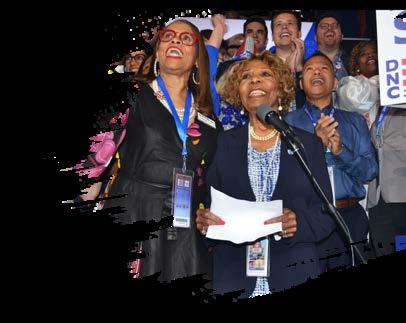
for. It acknowledges the contributions and sacrifices of Black women who have been on the frontlines of the battle for equal rights. From the brutal assaults faced by civil rights activists like Hamer to the ongoing struggles for justice today, this moment is a powerful testament to our resilience and strength.
As I listened to Harris speak, I couldn’t help but feel a renewed sense of hope. Her nomination represents a significant move toward what the Founding Fathers envisioned as “a more perfect union.” It reminds us that our democracy grows and evolves as we strive for greater inclusivity and justice. This moment is a validation of our collective struggles and a beacon of hope for the future.
Kamala Harris’ nomination is about more than breaking barriers—it’s about redefining leadership in America. It’s about recognizing the strength and resilience of Black women and ensuring our voices are heard.


As recited at the 2024 Democratic National Convention Chicago, Illinois
We gather at this hallowed place because we believe in the American dream.
We face a race that tests if this country we cherish shall perish from the earth and if our earth shall perish from this country.
It falls to us to ensure that we do not fall for a people that cannot stand together, cannot stand at all.
We are one family regardless of religion, class, or color for what defines a patriot is not just our love of liberty, but our love for one another.
This is loud in our country’s call because while we all love freedom, it is love that frees us all.
Empathy emancipates, making us greater than hate or vanity. That is the American promise, powerful and pure.
Divided we cannot endure but united we can endeavor to humanize our democracy and endear democracy to humanity.
And make no mistake, cohering is the hardest task history ever wrote, but tomorrow is not written by our odds of hardship, but by the audacity of our hope by the vitality of our vote.
Only now, approaching this rare air are we aware that perhaps the American dream is no dream at all, but instead a dare to dream together.
Like a million roots tethered, branching up humbly, making one tree.
This is our country from many, one, from battles won, our freedoms sung, our kingdom come has just begun.
We redeem this sacred scene ready for our journey from it.
Together we must birth this early republic and achieve an unearthly summit.
Let us not just believe in the American dream. Let us be worthy of it.
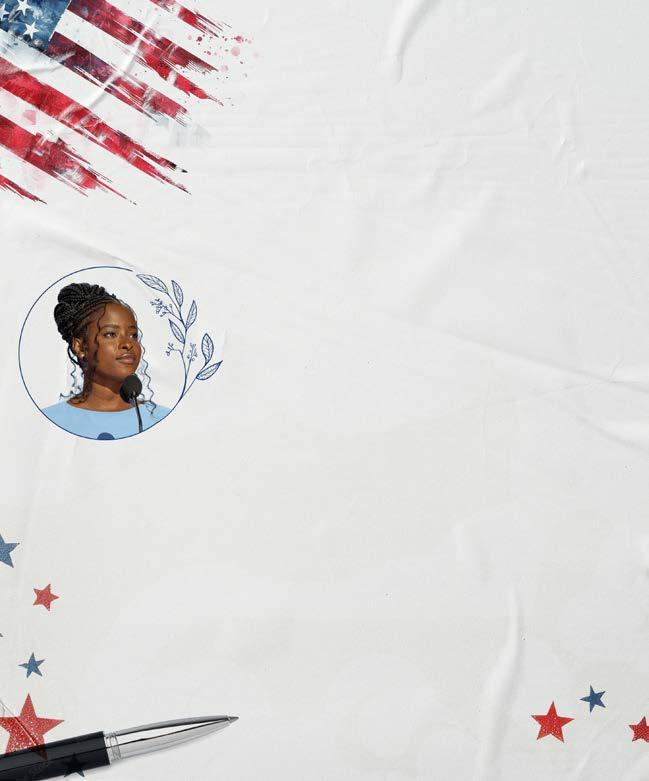
BY STEPHANIE BASS JACKSON
Kimberly Hunt’s professional journey is as remarkable as it is unexpected. Raised in Lonoke, Kimberly’s rural roots and upbringing in a traditional nuclear family laid the foundation for her future career advising some of America’s most influential political leaders. Her family’s values of hard work, education, and service shaped her approach to life and career.
Kimberly’s career in politics wasn’t planned. Like her parents, she initially pursued a career in education after earning bachelor’s and master’s degrees from Texas Women’s University and Amberton University.
“I thought I was supposed to be a teacher,” Hunt said, and she was for a brief stint but ultimately found her footing in consulting with low-performing and failing school districts. She worked with more than a hundred districts in seven states helping them improve graduation rates. But an unexpected discussion at a Greek step show made Kimberly change course and lean into her passion for helping people.
“There was this young woman there who was running for judge, and she was collecting signatures to get on the ballot. I signed her petition and thought ‘this young woman needs some help.’
Seven successful judicial candidates later as the campaign manager, Kimberly got a call from a presidential campaign to ask her to lead efforts to help elevate that candidate’s profile among the Black voters. Since then, she’s been called upon to elevate and amplify the profiles for two prospects for vice president, a U.S. senator and two governors. She also worked on confirmation hearings for Associate Justice on the United States Supreme Court Ketanji Brown Jackson
Kimberly said her strength lies in her ability to build and nurture relationships, a skill that has made her invaluable in the world of political strategy and public affairs. She points to her experiences growing up in a small, predominantly White town as providing the insights needed to connect with people in both urban and rural places.

Kimberly’s experiences and skills converged, allowing her to contribute meaningfully to the crisis communications team on which she served and advise on policy issues that impact Black and brown communities.
A leap into the unknown
Being assertive is a blessing. Being bossy is a blessing. “ ”
The shift from education to politics was one of the biggest risks of Kimberly’s career. Moving to unfamiliar places and navigating high-stakes environments meant stepping far outside the structured world in which she grew up. But through prayer and a clear sense of purpose, she has thrived. Her self-assured and bold nature—once criticized as too bossy and too abrasive—has become one of her greatest assets. And through her “Pipeline to Politics,” she mentors young Black and brown women to, like her, be themselves and know what motivates, excites and fuels your passions, while also equipping them with the tools and knowledge to succeed in leadership and public service.
“Where I’m from, a contractor is someone building houses wearing dirty boots,” she jokes.
But her role is much more—strategist, advisor, connector, and behind-the-scenes leader. Her network spans prominent leaders like Rev. Al Sharpton and NAACP president Derrick Johnson. As a connector, she is often the person who can open doors and foster collaboration. Yet, Kimberly remains deeply connected to her Arkansas roots. She often shares political insights to her mom so she can tell her friends at Bible study. Kimberly exclaims to everyone, “I love catfish fried hard with white bread.” Her ability to balance her small-town upbringing with her high-powered career is a testament to her authenticity.
Kimberly found herself at the pinnacle of her career, just as “the world was burning down” after the murder of George Floyd. “Minneapolis was the epicenter, and working during that time was the culmination of my lived experiences.”


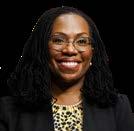


Exploring the nuances of African American culture by highlighting the diverse narratives, concerns, aspirations, and accomplishments that make us uniquely US.

LET’S TALK MENTAL HEALTH: A CONVERSATION BETWEEN THERAPISTS
MENTAL HEALTH IN THE PULPIT A MOTHER'S PURPOSE THROUGH PAIN
LET’S TALK MENTAL HEALTH
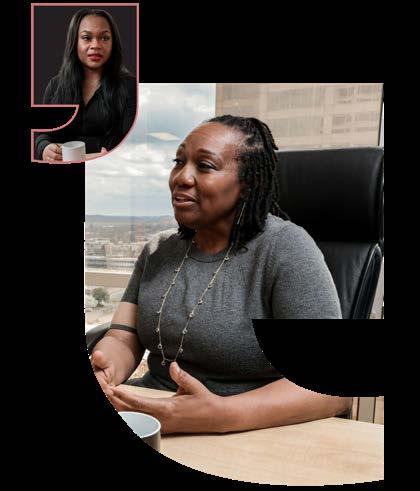
Conversation with Sharita Bilson + Helen Wayne, Therapists
These are not the terms always most associated with therapy. But according to Helen Wayne and Sharita Bilson, they should be. In a NOIRE discussion with Tanisha Joe-Conway, the two licensed therapists emphasize the significance of mental wellbeing and the role of competent clinicians in guiding individuals toward a more fulfilling life.
Helen Wayne is a Licensed Clinical Social Worker (LCSW) at United Family Services Incorporated who works primarily with kids involved in the juvenile justice system, but also with adults. Sharita Bilson is a Licensed Professional Counselor (LPC) at her private practice, Grace Place Therapy, specializing in Black mental health and wellness in adults.
I work with a lot of professionals who have high-functioning depression. We don’t always have the option to say, ‘I’m too sad today. I’m just going to stay in bed and not go to work.’”
“And, then add some trauma, too,” Wayne continued. “That’s going to be another piece – even with my kids.”
Issues like generational trauma, religious concerns, feeling safe to share, and finding the right clinicians all play a part in making minorities feel comfortable seeking assistance.
“It is okay to say, ‘It ends right here with me moving forward,’” Bilson said of generational trauma.
As for faith, Wayne contends, “I believe you still come to church and still believe prayer works. But, I also think that going to see a therapist is also helpful.”
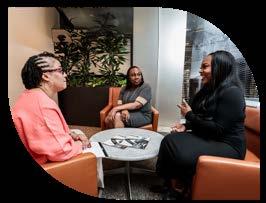
“It encompasses just who you are,” Wayne said. “It’s about your social well-being.
“All those factors affect how you think, how you feel, how you behave.”
Bilson continued by stating that mental health is “that connection between your mind and your heart.”
People choose therapy for all types of reasons, from relationship issues to walking through various life changes. A large portion of what Wayne and Bilson see is attributed to anxiety and depression.
“A lot of times you have anxiety, and then if you can’t manage the anxiety, it sometimes causes you to go into a depressive state because you’re just overwhelmed with whatever is causing the anxiety,” Bilson said. “Then, when you’re feeling depression, it makes you feel like there’s a loss of control, and you’re just kind of in this dark place.
“If you have the power of the Holy Spirit and therapy,” Bilson believes, “you cannot lose.”
Access and safety are huge to minority communities as well, and relational service seems to be key.
“It’s kind of like we don’t have to do the explaining, or we don’t have to do the code-switching,” Bilson said. “You literally get to show up as your most authentic self.
And, that’s probably one of the best parts of treatment.”
While mental health remains somewhat taboo in the minority community, there are signs that things are making a turn.
“There’s still a small group of people who don’t really believe in therapy,” Bilson acknowledged. “But i want to say the Black community has been showing up strongly.
They see it as being just as valuable as their self-care.”
Wayne added that her young clients may think there is nothing wrong with their mental health.
“Adults who’ve had more life experiences are probably more appreciative of the therapy process itself,” she said. Both encourage people to consider therapy. They cite the importance of finding a clinician who understands that
there are reasons why clients behave the way they do.
“When you understand that, you have a little bit more compassion, more empathy, grace,” Bilson said. “Then people will probably be a little more receptive even of the therapy process.”
Wayne added. “Please don’t come in and expect that ‘If I come to a couple of sessions, then that’s it.’ Therapy is a process, and it doesn’t often happen fast, so I would say go through the journey.”


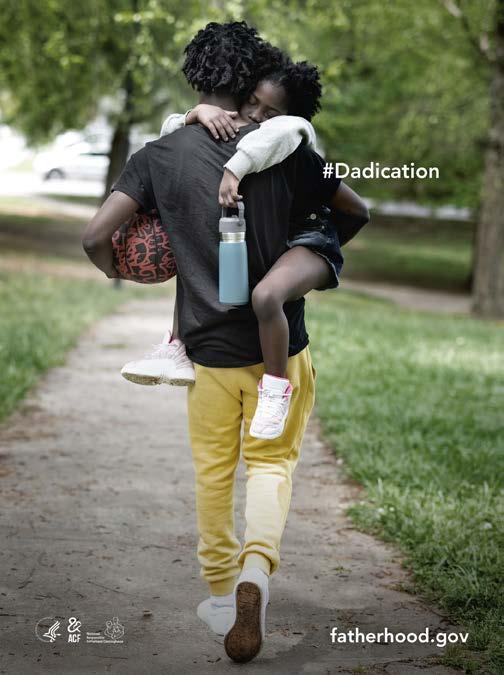


BY TANISHA JOE-CONWAY
The pastoral calling is one of service and sacrifice. It is a calling that is spiritually, emotionally, and physically taxing and requires long, irregular work hours. Although not always recognized, sometimes the shepherds need shepherding, too. So, who does the “called” call when in need of rest, restoration, and resources to support their mental health?
REV. DR. PHILLIP L. POINTER, SR. WAS PHOTOGRAPHED EXCLUSIVELY FOR NOIRE BY CORICREATED.
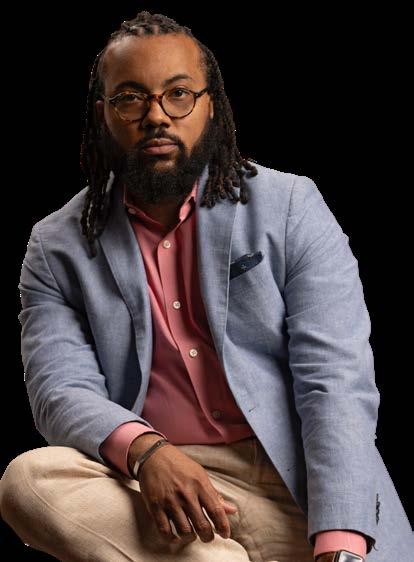
We spoke to Rev. Dr. Phillip L. Pointer, Sr. about mental health among the clergy. The Senior Pastor at Saint Mark Baptist Church in Little Rock maintains that “pastoral depression and suicide have always been a problem within the clergy community; it hasn’t been addressed publicly until recently.”
Reverend Pointer acknowledges that he and several colleagues have experienced severe seasons of depression. Reports from both the Duke Divinity School and Lifeway suggest that well over 60% of pastors experience stress and anxiety-related mental health issues during their ministries.
Clergy also face unique challenges while counseling their congregants’ emotions and cloaking their own.
“Pastors must have a superhuman emotional dexterity to be overwhelmingly happy for a person who greets them on Sunday having the best week of their life, and then being equally sorrowful and pained for the person who greets them on Sunday who has the worst week of their life,” Pointer said.
When speaking biblically about mental health, Reverend Pointer asserts, “Many of the great heroes of scripture show signs of depression – Noah, Moses, Samson, Jeremiah, David, Elijah, Job, and even possibly Jesus himself.”
“Theologically, depression is the result of the fallen humankind’s knowledge of the ideal and its distance from the actual,” he said. “We long for the state of perfection that God intended in the beginning and promises those who trust Christ at the end.
“But, we’re confronted every day with the world’s unwillingness to fulfill that ideal and our own inability to do it. So, we must challenge ourselves to strain to maintain our hope and to find some peace with the imperfection we see within and outside of ourselves.”
Pastors often mask their issues for the sake of doing the Lord’s business and because of the stigma surrounding mental health. When they do reach out, it can be difficult to find clinicians qualified and ready to assist.
“I’ve also experienced frustration when a therapist or mental health professional engages a pastor as a colleague [someone who is trained in counseling] instead of as simply their client,” Pointer said.
He contends that parishioners need a deeper comprehension of the pastor’s biblical responsibilities alongside the intricacies of contemporary church demands and human constraints. Armed with this insight, the congregation would acknowledge not just the obligations of church leaders but also the imperative to offer respite, counseling, or any necessary assistance for their restoration. Churches should also consider adding mental health conversations to their community initiatives, similar to those designed to feed and clothe the homeless or visit the sick. “This begins with reaching the most vulnerable from within – including pastors, leaders – and expanding to members, and then the community,” Pointer said. “Making partnerships with mental health professionals and organizations must take priority in today’s church life.”
Scripture says in Thessalonians 5:12-14 that congregants should honor and care for pastors and esteem them very highly in love because of their work. That suggests watching over them spiritually, physically, and mentally.
Reverend Pointer stresses that we all must remember, “Depression thrives in the dark.” Seek immediate attention for this and any other mental health concerns.
We should be diligent about bringing mental health to the light – including for those who keep watch over us.
“
• Praying for your pastors.
• Encouraging clergy to be assessed.
• Creating a circle of accountability.
• Layering other leaders to handle certain needs of the membership.
• Requiring sabbaticals of rest, recovery, and treatment away from duties.
• Setting up spaces to share about the challenges, celebrate the journey, encourage others, and share information and resources.
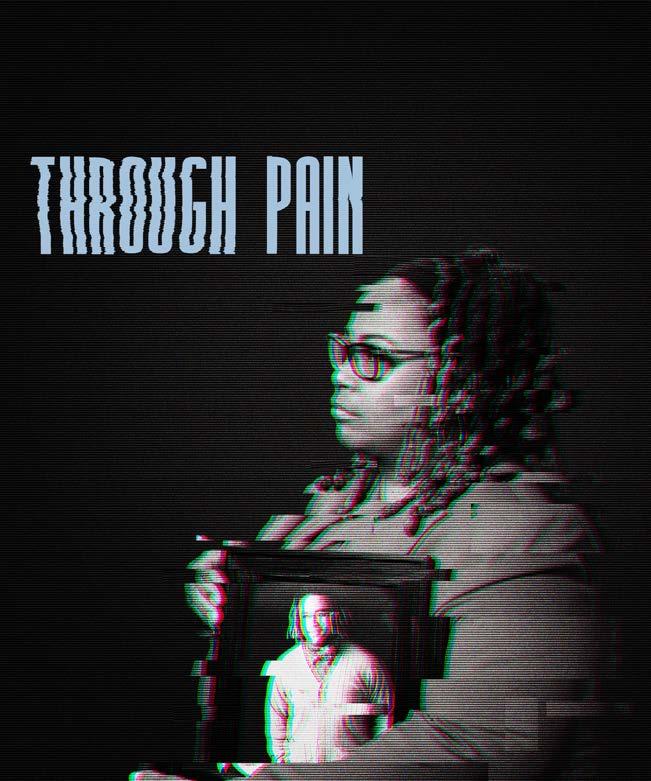
“
I HAVE LITERALLY FOUND PURPOSE THROUGH THE PAIN AND SUFFERING THAT I’VE BEEN THROUGH.”
That’s the question that replays over and over for Kymara Seals.
To have a child give up on his passion for football. The same child, always overly concerned about his hygiene, pushed aside his grooming habits. The child who loved people, laughed from his belly, and knew how to throw a good party, began spending days on end in isolation.
It was obvious that her 19-year-old son, D’Andre Akeem Seals, was different. “We started noticing his conversation and how it was starting to change. He would say things that didn’t make sense or were irrelevant to anything we were talking about.”
One day in particular, though, stood out.
“The day that I realized something was really wrong with my son, it was trash day. This particular day, he rolls the trash can through my house,” Seals said. “It was in that moment, I knew something was wrong.”
D’Andre was oblivious to what he was doing, even questioning his family about what he could be doing wrong. To him, he was simply taking out the trash. But to his mother, his actions were indicative of something more.
Her suspicions were rooted in her own mental health. Just four years before, Seals was diagnosed with severe anxiety disorder, depression, PTSD, and mood disorder. While still coming to grips with her triggers and symptoms, it was clear that her son’s mental illness was presenting differently. So she sought help for D’Andre immediately after that pivotal day. The first test he was administered, however, showed no signs of mental illness.
“He wasn’t just a 19-year-old kid that was being a kid. No, something’s wrong with my child. I know my child, but they missed it,” Seals recalls.
When the signs persisted, she took another step, calling D’Andre’s dad for help. He came to Pine Bluff to relocate his son to Dallas, Texas to be with him, hoping a new environment would be helpful. But not long after, D’Andre was admitted to a mental health facility.
“They did an in-house diagnosis. We found out he was bipolar, manic-depressed,” Seals shared.
Following that official diagnosis, their son would live for only three months.
The chilling call came on June 17, 2014. “Well, D’Andre is gone,” his father said into the phone. Not understanding, Seals asked where had he gone, prompting his dad to clarify that, “No, he’s gone. He shot himself.”
“I said, ‘Oh, my God, I’m on the way, what hospital?’ It didn’t register that he was gone,” Seals remembers being instantly paralyzed mentally, physically and emotionally.
Suicide is a word that Seals says goes under the radar in her community.
“We don’t want to hear the word. We don’t want to say the word. We don’t understand what it means,” she said. “I wasn’t well. I was not well. It was a very difficult time. The anxiety magnified. I was just tired, fatigued, and grieving. I still grieve. I mean, it’s a process.”
In the process of time, it took four years for her to strike action into action. Believing that “God put on her heart to move,” Seals started the nonprofit D’Andre Seals Suicide Prevention Outreach Project in 2018.
“It’s like I’ve found my purpose, through all the pain and suffering that I’ve been through.”
Through summits, speaking engagements, and partnering throughout the community, Seals has been able to touch the lives of hundreds.
It’s been nearly ten years since that fateful phone call. And still, each day comes with its challenges.
“There are some mornings I wake up, and I think it just happened; I have to catch my breath.”
But Seals doesn’t want what D’Andre went through or her family’s loss to be in vain.
“There was pain in seeing him not be himself. There was pain in seeing everything leading up to his death. It hurt. I want the legacy [of the nonprofit] to lead people to resources, empower people to live in the grief, but to also live in their purpose.”
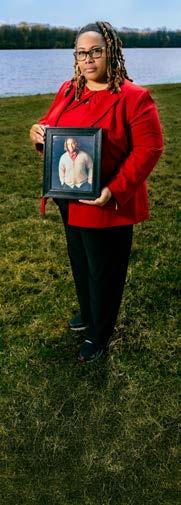

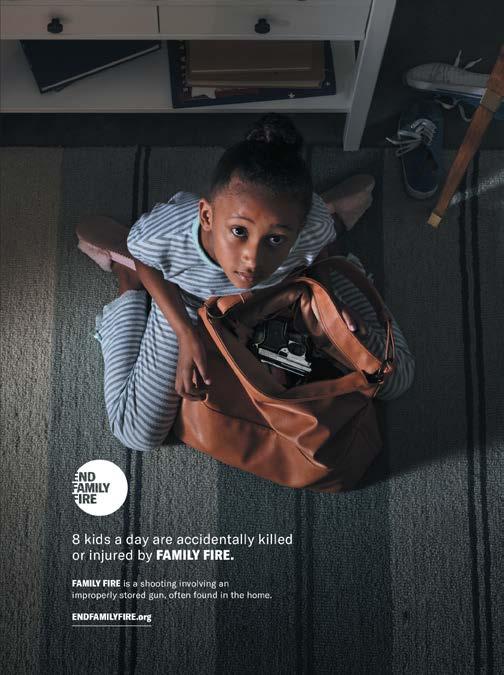


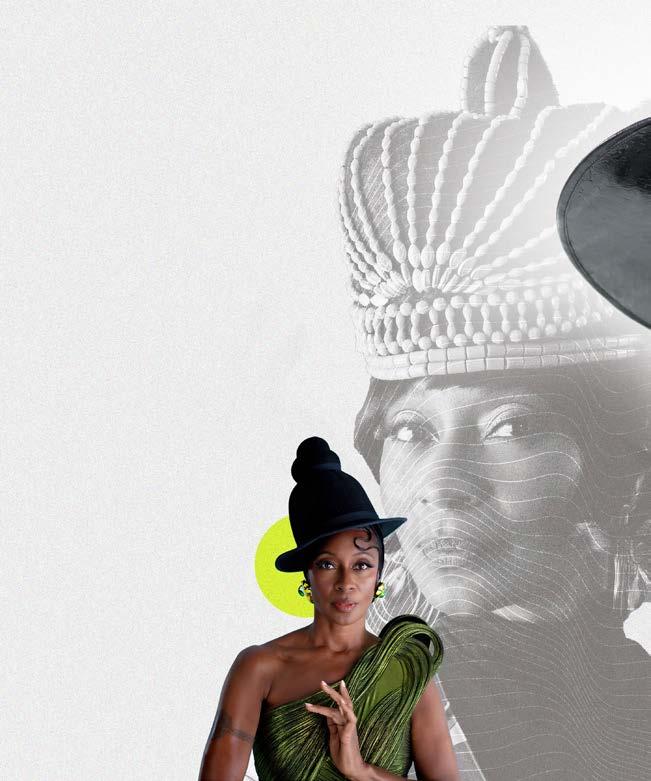
BY SERICIA NELSON

BY

Khadijah Lewis, born Helen Hayes and raised in Little Rock’s Granite Mountain area, attended Horace Mann High School. As the captain of the majorettes, she was encouraged by her band director, Sterling Ingram, to try out for the majorettes at his alma mater, Tennessee State University. “Mr. Ingram gave me the information, and I begged my mom and dad to let me go,” she recalls.
Undeterred by the lack of an acceptance letter, Khadijah made her way to TSU and stayed in the dorms to audition. The woman overseeing the tryouts recognized her potential, and despite the competition from over 75 girls, Khadijah ended up being the mastermind behind the audition routine which allowed her choreography skills and leadership abilities to shine. “I danced my behind off, and I got it,” she says. Little did Khadijah know that her successful audition was a harbinger of her daughter’s future.
After finally receiving her acceptance letter and securing a spot on the majorettes, Khadijah embarked on her first trip with the team to California. It was then that she fell in love with the state, a feeling that never subsided.
During her time at TSU, Khadijah met a musician, and their relationship led to the birth of a baby girl. Determined to return to school in the spring semester after giving birth, Khadijah came back to campus with her 5-month-old in tow. Fondly known around TSU as the “campus baby,” Khadijah says everyone adored her daughter, Fatima.
Along with motherhood, Khadijah’s life was transforming in other ways. She and Fatima’s
father got married, and soon after, they embraced Islam. During that period, she shed “Helen,” the name given to her by her parents, and stepped into her new identity as “Khadijah,” the Muslim wife and young mother.
When things didn’t work out in the marriage, Khadijah went home to Arkansas. But she felt a nagging tug towards California. “I couldn’t get California out of my mind,” she explains. With nothing but deep longing and a car gifted by someone, she decided to head west—despite her family’s misgivings. “My mom didn’t want me to go. She had purchased a house for me on the next corner,” Khadijah remembers. “But let me tell you, it was like a burning desire; I had to go. I told my mom, ‘I’m sorry.’”
Her journey first took her to Compton. There, Khadijah, pregnant with her youngest daughter, and her two older children, 4-yearold Fatima and 2-year-old Nefertiti, stayed with an old majorette friend from Arkansas before finding their footing. “We lived all over California,” Khadijah says of those early days before she and her girls got settled, supported by her work as an up-and-coming hairstylist.
Over time, as Khadijah’s clientele grew, she incrementally upgraded her little family’s California lifestyle. While working in one salon, she was inspired to leave Islam and return to her Christian roots (“I accepted Christ in my heart and got filled with the Holy Spirit”). She began attending church regularly at Los Angeles’ Crenshaw Christian Center and saw things shift for the better in her personal life and her finances—which in turn helped her children, who were older by then, to thrive.
Fatima Takes Center Stage
Khadijah Lewis now resides in Little Rock, leading a fulfilled life as a pastor’s wife. Reflecting on raising Fatima in an environment where her talent would break through at the age of 21, she gushes with pride over her firstborn. “Fatima is literally incredible. Her work ethic is so good. It’s crazy. There is no procrastination in her once she sets her mind to something.”
Interestingly, while Khadijah’s three girls would often entertain her and her friends –she would call them her “Solid Gold dancers” – Fatima harbored no dreams of doing it for a living. According to Khadijah, Fatima actually wanted to emulate her and even earned a cosmetology license to do hair. A career in dance was nowhere in the plans.
As Fatima tells it, “It was just a hobby, really. In LA, they had clubs for 18-year-olds where they didn’t sell alcohol. I would go; it was just something that I loved to do. It wasn’t something I thought I could make a career out of or anything like that.
“
BUT JUST BEING IN LA AND PEOPLE SEEING ME DANCE, THEY’D ASKED ME TO DO MUSIC VIDEOS AND THINGS LIKE THAT.”
It was just really being in the right place at
the right time.”

Once she realized her pastime could be something more, she got serious. “When I saw that I could make a career out of it, I began to learn my craft more, take classes, and understand the business a little bit. I just trusted and followed my instincts and intuition with where it was taking me, and it just kind of all worked out, I think.”
Spoiler Alert: It Works Out
Having some context for Fatima’s early life is akin to observing the complimentary movements of background dancers: It allows the main act to shine.
But don’t get the backstory twisted. Khadijah’s story ultimately gave rise to Fatima’s glory. The proof is in Fatima’s billing as a multi-hyphenate over three decades.
She has made a unique imprint on hip-hop history and the entertainment industry as a dancer, choreographer, creative director, and producer.
And if they are indeed somebody, it is likely that they have been moved by Fatima’s talent.
Michael Jackson? Aaliyah?
Whitney Houston? Brandy?
Mary J. Blige? Kendrick Lamar?
Fatima has worked with each, just to name a few.
If we’re talking world stages
The Grammys? The Oscars? The Super Bowl?
she’s got credits for those, too. And lest we forget, besides
wonderful woman,” and her two younger sisters. She is also proud of her connection with her son—a relationship that is a dance of its own.

she was also the tour de force behind blending dance together with storytelling in
serving as director of choreography on Beyoncé’s history-making Renaissance World Tour, 2023’s musical adaptation of the film “The Color Purple.”
Quite simply, Fatima is THAT GIRL. An inductee in the Arkansas Black Hall of Fame, California was undeniably her launch pad, but still, the South runs deep in her.
“I really love being a Southern girl… just having family and the feel and energy of the South is so different than California,” shares Fatima, who makes her home in Ojai, outside of Los Angeles. “I love being able to go to Little Rock and go to a church and see 90 percent of my family there. My Little Rock roots have really instilled in me the love of family, the importance of family, and having them around me. We didn’t have a lot of family here in California, but I would go back to Little Rock every summer.”
While Fatima doesn’t get back to Arkansas too often, she maintains strong bonds with her mother, whom she glowingly says is “a
“I don’t know why they say when they’re 18, they’re adults because that’s not the case at all,” Fatima laughs, citing the pandemic, in particular, for presenting some unique hurdles. Now 23, he is carving his own path at New York University, and Fatima is embracing this new phase of their relationship. “We really are creating a closeness that happens when they grow up. It’s beautiful,” she says, looking forward to the future when her son has a family of his own.
For now, Fatima is content to continue in the lanes she has expanded beyond just creating dance moves. When called for a job, she brings her entire suite of gifts, lending her expertise in every performance aspect, including costumes and makeup to lighting and set design. It’s been an incredible career arc for someone born in Little Rock, on Michael Jackson’s birthday, who never imagined the heights she would scale in show business.
“I can’t even say all the things I’m doing and have done were things I said I was going do. They came up into my life, and I’m like, ‘Oh, that sounds interesting, let’s check that out.’ I never thought someone would make ‘The Color Purple’ into a musical movie, but when it came to me, it made sense, and it felt right,” Fatima says, adding, “I just want to continue growing … directing film is in the works. I want to keep mentoring people and watching them grow. Becoming a grandmother will probably be one of my happiest and biggest achievements.”
Whatever her next move, it is certain to be iconic. And Arkansas, with the rest of the world, will be watching the art of Fatima.

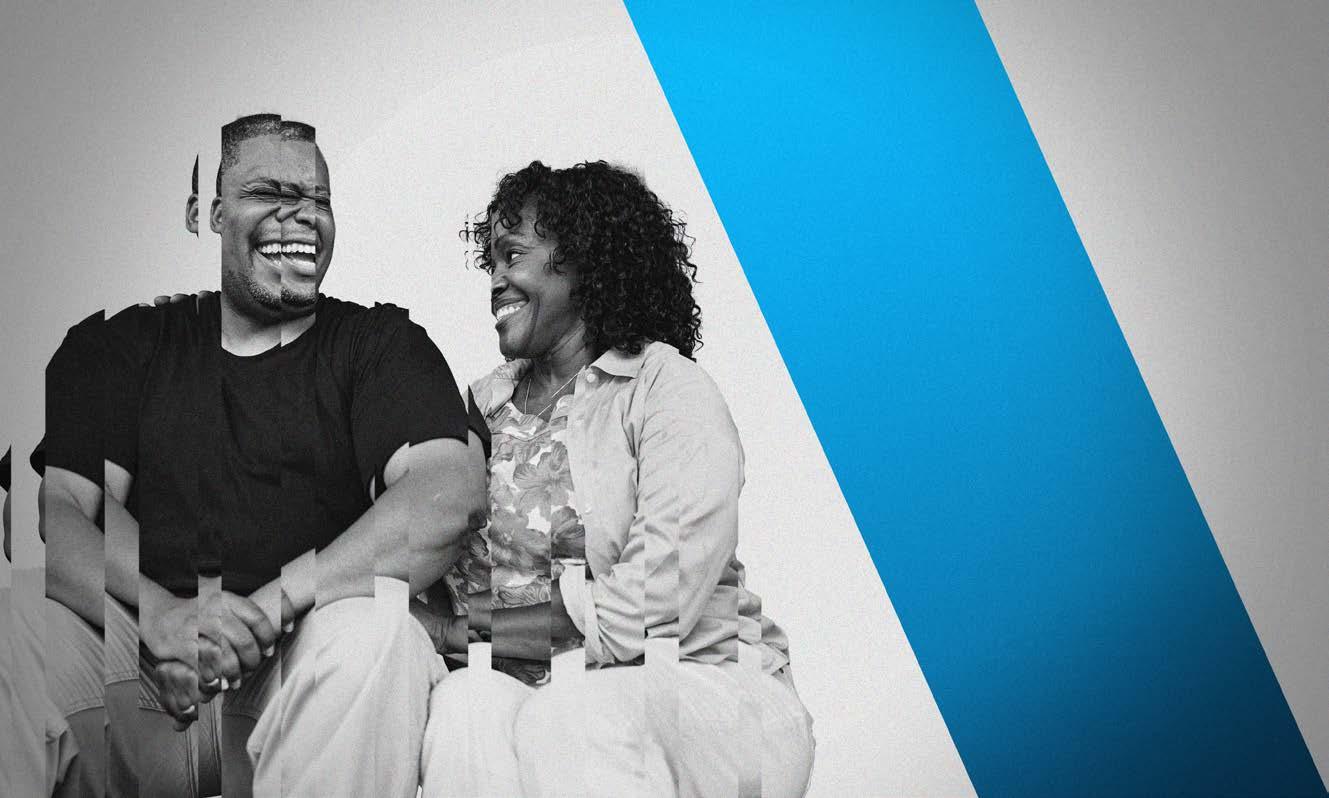
Knowing and understanding our community’s struggle strengthens our identity and empowers collective action.

NEWS: OPIOIDS PART 2 – A FAMILY SPEAKS
PEOPLE : NASA’S RUTH JONES & CHICK-FIL-A’S KATIE BRANCH
PLACES: HEIRS PROPERTY IN ARKANSAS
FIRST PERSON: REGGIE JAMES, PRESIDENT OF MUSIC MOVES
(PART 2)
“ BY L. LAMOR WILLIAMS
It’s hard to imagine anyone having a more complicated relationship with fentanyl than Bobbie Spivey.
Before her mother lost her cancer battle in 2015, fentanyl was a blessing. The powerful drug, 50-100 times more potent than morphine, provided the matriarch with relief from pain that most will never know.
Seven years later, fentanyl was a curse, responsible for the death of her ex-husband and father of the two youngest of her four adult children.
Today, it’s a shadow that follows Bobbie daily in her work. As a former Arkansas Department of Corrections officer, and now as a bailiff in the Faulkner County court system, she must have Narcan on her duty

belt, ready to reverse overdose. And nitril gloves take on a new meaning because even touching fentanyl can be life-threatening. She vividly recalls the warnings of her mother’s medical staff to never handle fentanyl patches bare-handed as she dutifully replaced them monthly.
While Bobbie’s story is extraordinary, many in the Black community have been impacted by the opioid crisis, once seen largely as a problem for white Americans as it was born from over-prescription of opioid painkillers. It’s been well documented that doctors were and are much less likely to prescribe opioids to African Americans due to biases that have led to wide racial and gender disparities in healthcare.
According to the Arkansas Center for Health Improvement, this state has the secondhighest rate of opioid prescriptions per capita in the nation but is among the lowest in terms of recognized opioid-related deaths. The Kaiser Family Foundation reports that in 2021 – the latest year for a complete data set analyzed by demographics including race and ethnicity – Arkansas saw 386 opioid overdose deaths including 316 white victims and 57 Black.
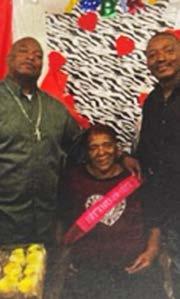

While Arkansas’s numbers may not seem high, especially in comparison to the thousands that lost their lives elsewhere, each death is a void in someone’s family. And ACHI expects Arkansas’s numbers to increase because new protocols require a wider array of postmortem exams that will likely capture more of such deaths.
The Spivey family story is part of the reporting issue – but from a different angle.
In February 2022, Tony Spivey, Sr. went missing after leaving his job at a Little Rock rehab center and stopping at a nearby bar he sometimes frequented to have a few beers. After being unable to reach their father to wish him a happy birthday and more than a week afterward, Tytiana Spivey, Tony Spivey, Jr. and Bobbie filed a missing person’s report with authorities. Joined by the stepdaughters he helped raise, LyTina Holmes and Tracy Watkins, Bobbie and the family set out in search of Tony Sr.
What they discovered was chilling: video footage from a nearby convenience store showing Tony Sr. in the back seat of his Lexus with two men in the front. The family provided the footage to police, but Tony Sr. would later be found in an abandoned house in North Little Rock. The autopsy listed fentanyl as the cause of death but didn’t name any of the telltale signs of drug use. Instead, the report found that Tony Sr. had ingested the drug as traces were found in his stomach.
The family believes the men put something in Tony Sr.’s beer, perhaps to subdue him, but it killed him instead.
“In 26 years of him being in my life, I never knew Tony to drink hard alcohol, smoke marijuana, or even smoke a cigarette, and here it is that he passes from fentanyl. We just don’t understand that,” Bobbie said during a Sunday afternoon interview in her Conway home with Tytiana and Tracy sitting nearby, and Tony, Jr. – now in U.S. Navy dental school – on the phone.

“And his car still hasn’t been recovered. To us that says homicide, but they’ve just written him off as some Black drug addict who OD’d because he was found in an abandoned house and yes, he had gotten in trouble back in the day and had a record, but not for drugs,” she said.
A North Little Rock Police Department spokesperson said, “Our investigators have been in contact with the family of Mr. Spivey regarding this case. We understand that the loss of a loved one is difficult in any circumstance, and we are available to assist them in any way we can as they navigate the journey toward healing.”
Bobbie reports that an investigator did contact Tityana and that Tony’s case is being reopened.
Tityana joined her mother for this interview three days after her 23rd birthday and three days before what she would later refer to in a Facebook post as the “heavenly birthday” for her “papa bear.”
They join so many others for whom fentanyl has left empty seats at family celebrations.
“Before it happened, me him and my brother took a trip to Mississippi. That was February 11. We came back on the 13th. The last time I heard from him was him telling me happy birthday,” Tityana said. “The whole month of February is tough. I don’t think my birthday will ever be fully the same. Even if we do find out what happened to him, it will never be the same without him.”
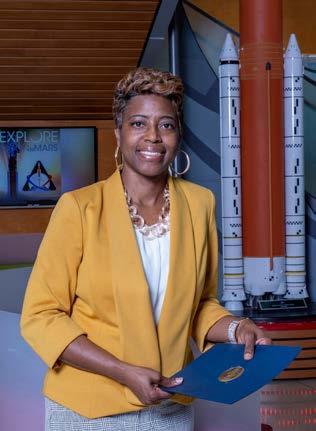
BY ANN WHITE-TAYLOR
When Ruth Jones enrolled in the business program at the University of Arkansas at Pine Bluff in 1989, she never thought she would end up with a Ph.D. in physics. “I had decided that I wanted to be an accountant,” Jones said recently. “Since third or fourth grade, numbers always came easy for me.”
Her professors took note, and during her freshman year, one of them, Dr. Miah Adel, encouraged her to switch her major to physics. But it didn’t happen overnight.
“I brushed him off until my junior year,” she said. When she did, however, it changed the course of her life. A deputy division chief of avionics at the NASA George C. Marshall Space Flight Center in Huntsville, Alabama,
I wanted to be a physicist... so I decided to go all the way.” “

Jones has spent the last 28 years helping develop technology used for space travel. During her career, she has worked on some of the most visible projects developed by the agency including the James Webb (formerly the Hubble) telescope and the Observatory Carbon Project which was launched in 2009.
For Jones it has been a labor of love. “There are always exciting projects that make the world better,” she said. A native of West Helena, she graduated from Central High School there, but said she had no intention of going to college. “I wanted to go the military,” she said, “but I had a medical condition that would not allow me to enlist.” So she accepted a full scholarship to attend UAPB, and after heeding her professors’ advice, she found that she liked physics, although the curriculum was challenging.
“There was more math (in physics),” she said, “but it was related to everyday life. It was more than just writing numbers or looking at a bank statement.”
Soon after, Jones said she knew she wanted to become an astronomer and work for NASA. Her first opportunity to fulfill that goal came during her junior year when she interned at the Goddard Space Flight Center in Greenbelt, Maryland, and one of her duties was to collect dust particles to see what was in the air.
“It was different,” she said. “I liked it because I was doing something that had to do with real life.”
In 1994, after becoming the first woman to earn a bachelor’s degree in physics from UAPB, she enrolled in the graduate program at Alabama A&M University in Huntsville, earning a master of science degree in 1997 and a doctorate in 2000. She became only the second African American woman to receive a doctorate in physics in the state of Alabama.

“I wanted to be a physicist,” she said, “so I decided to go all the way.” Armed with a doctorate, Jones was hired full-time at Marshall Space Center and began working in optics, making small, lightweight mirrors for various projects, and was part of a team that developed the mirrors that are used on the James Webb Telescope. Among the many images recorded by the telescope include the Pillars of Creation – part of the Eagle Nebula, a cloud of gas and dust that has lots of stellar nurseries or areas packed with ionized or active hydrogen – in near-infrared view.
Jones, a mishap investigation specialist with the NASA Safety Center Mishap Investigation Support Center based out of NASA’s Glenn Research Center in Cleveland, also was part of a team that investigated the failure of the Orbiting Carbon Observatory a NASA satellite mission intended to provide global space-based observations of atmospheric carbon dioxide. The spacecraft blew up before it reached orbit, and one of her duties was to help the team determine what caused it to crash.
“The fairings (wings) did not open,” she said. “Something similar happened on another mission that wasn’t the same thing, but we eventually got the problem solved.” Her current role oversees projects that include working with printed electronics that are used on a spacecraft.
Jones is proud to have been lauded for her work, having earned several awards, including a Marshall Center Director’s Commendation in 2003 and a Glenn Research Center Director’s Commendation in 2011. The NASA Safety Center focuses on improving the development of personnel, processes and tools needed for the safe and successful achievement of NASA’s strategic goals and missions. In 2012, Jones assisted in three investigations requiring rapid intervention and assistance, including an asbestos exposure mishap at Glenn.
Looking back over her professional ascent, Jones has no complaints. “It has been a satisfying career,” she said, “and UAPB really prepared me well.”
Ultimately, Jones’ decision to explore physics proved to be the right one. One small step that led to a giant leap for a product of the Arkansas Delta.
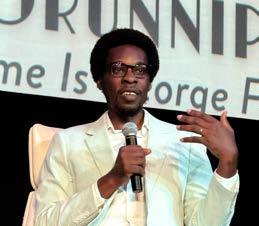
Embrace defiance.” That’s what Toluse Olorunnipa told me when we sat down to discuss his Pulitzer Prize winning book, His Name is George Floyd. co-authored with Robert Samuels.

BY STEPHANIE BASS JACKSON
As a part of the 2024 Six Bridges Book Festival, hosted by the Central Arkansas Library System, Olorunnipa shared why defiance and hope go hand in hand.
“Defiance is an important part of our history and our future,” he said. Certainly so, and at a time when more books are being banned and hard truths about our history are being silenced, reading and writing—especially stories that challenge the status quo—can feel like an act of rebellion. I asked Toluse what the experience of writing this important story was like for him. He moved to Floyd’s hometown of Houston for more than a year to better understand Floyd’s life.
Urgent and revolutionary.
“I was a [Washington Post] White House reporter covering the politics of the country, and we saw the
LEARN MORE about the Six Bridges Book Festival at sixbridgesfestival.org.
entire country be upended by having to see a man be murdered on camera,” Olorunnipa said, capturing the visceral impact of Floyd’s death. This public witnessing of violence shocked the nation, but for Olorunnipa, it was also a call to action, urging him to examine the roots of this oft-repeated tragedy.
“I wanted to be a part of the movement to show that journalists have a role to play. Authors have a role to play” in resisting the erasure of Floyd’s humanity and fighting against the larger systems that make it hard for people like Floyd to live freely and safely in America.
“A lot of time when you’re becoming a hashtag your humanity gets taken away…. People don’t know who you are as a person. They don’t know your story. They don’t know your family’s story. So [we] thought we could give some of that humanity back, not the symbol, not the racial justice icon, but the human being George Floyd.”
His Name… is not solely a biography of Floyd’s life— the book explores the systems and history that made the brash killing possible. In doing that, Toluse knew the book was likely to spark some backlash.
“This book was banned in certain locations because we talked about systemic racism. Largely, people that are banning books are trying to keep people from getting access to information, and we know information is power. The ability to tell one’s own story is power. The ability to not become a caricature and allow someone to take your story and turn it into something completely different, that is power as well.”
Even with all the challenges and the pushback, Olorunnipa remains hopeful. The last chapter of His Name is George Floyd is titled “American Hope,” a reflection of his belief that, despite the country’s dark past and current attempts to stop progress, it’s still happening all around us.
“If you only look at the negative and how long it takes to get progress, it can be disheartening,” Olorunnipa said. “But we wanted people to know change is happening. It’s happening slowly, but it is happening. And it’s happening because we as a people are not giving up,” he said.
“A much-needed portrait of the life, times, and martyrdom of George Floyd, a chronicle of the racial awakening sparked by his brutal and untimely death, and an essential work of history I hope everyone will read.” —Henry Louis Gates, Jr., author of The Black Church: This Is Our Story, This Is Our Song

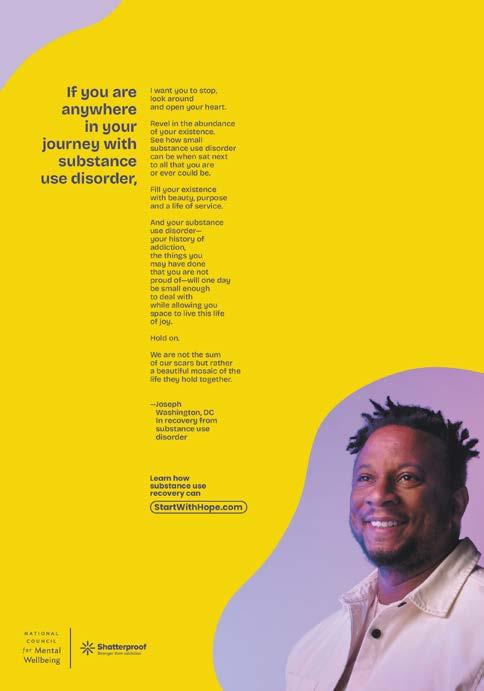
By Katrina Dupins
From humble beginnings to entrepreneurial success, Katie Branch is a testament to hope and resilience.

It began for Katie Branch in the small town of Humphrey, right on the county line of Arkansas and Jefferson Counties. Her parents, who divorced when she was 5, juggled three jobs between them caring for Katie and her six siblings. Despite the family’s financial hardships, Katie was instilled with a sense of gratitude for the sacrifices made on her behalf.
My siblings and my parents shaped me into who I am today,” she said. They laid the foundation for my journey into mentorship and community building.
Academically gifted, Katie was the first in her family to attend college. But on the campus of the University of Central Arkansas, she encountered obstacles of belonging and identity.
“It was a culture shock,” Branch said. “I had low self-esteem and felt I had to look a certain way, talk a certain way, be a certain way. That was miserable.”
Thanks to her faith and mentors, she found solace and guidance.
“That was revolutionizing and paved the way for what I do now, which is pour into our youth through mentorship, helping them bridge the gap.”
Steps Made to Order
Just two weeks after the birth of her first child, Branch finished college. She had secured an internship in information technology, which turned into a full-time job soon after graduation.
“I realized I did not like IT. It was not for me, but taking a risk was not in the equation at that time. I was responsible for another human being.”
In the workplace, Branch found herself grappling with some familiar challenges: feeling like she didn’t belong – that she had to be someone else to succeed. Fueled again by faith and determination, her perspective shifted when she leaned on Colossians 3:23-24: “Work willingly at whatever you do, as though you were working for the Lord rather than for people…”
Faith To-Go
Eight years ago, Branch’s family faced a significant turning point when her husband, Cornelius, was unexpectedly diagnosed with leukemia during a routine checkup.
Life tilted on its axis for Katie, her husband, and their three children as they embarked upon a year-long fight against cancer. Cornelius, now in remission, has undergone a bone marrow transplant but in the aftermath of their ordeal, the couple was struck by a sobering
reminder that life is short. They sat down to reassess their priorities and eventually decided to start a trucking company.
“Building that company made us better leaders and business managers,” Katie said. “We got to a point where we had to ask if we wanted to continue to grow this business or do something else. We re-evaluated and decided to find something we both loved.”
The Branches chose franchising. Katie had two rules: she had to love the product, and the company had to align with her beliefs and values. Chick-fil-A emerged as an obvious choice.
Chick-fil-A is highly selective and has a lengthy and tiered process for prospective franchise operators. In fact, less than 1% receive approval. Katie entered the process determined to learn as much as she could, no matter the outcome.

Work willingly at whatever you do, as though you were working for the Lord rather than for people…”
Gratitude is the Bottom-Line
In late 2023, Katie Branch became the first Black person to open and operate a Chickfil-A in the state when her restaurant opened in Pine Bluff, just a stone’s throw away from where she grew up.
Even as she’s made history, she wants the receipts to reflect the impact she makes in the lives of others.
“I’m humbled by the journey. I remember scrounging through my mom’s couch looking for dimes so I could buy a piece of candy from the store. Now I run a multi-million dollar restaurant, and I can give candy away. I’m so grateful for this opportunity to give back in more ways than I could have imagined.”

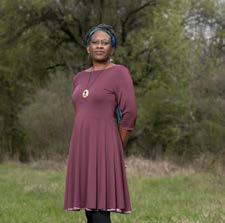
By Karama Neal, Ph.D.
When I was little, my mother, grandmother, and I would visit my great-uncle in rural Southwest Arkansas. He raised cattle and had a horse named Sugar that ate sugar cubes out of your hand.
I loved Sugar but was a little scared of one of his bulls. Once, a cousin and I stood on a haystack thinking the added height would make us more intimidating, but we didn’t matter to the bull. What mattered was where we stood – on our family’s land where my mother and grandmother were born, land my great-great-grandfather purchased after he left enslavement.
Those visits were the foundation of many fond memories, but eventually, my grandmother died, and later my mother died as well. I miss them always and deeply, and perhaps because of that, I feel even closer to the property than I did as a child. That’s also because, when they died, I joined dozens of my relatives in joint ownership of our family land, commonly called heirs’ property.
Heirs’ property is family-owned inherited real estate that is owned by multiple individuals with undivided interest. No one family member can point to any particular
part of the property and claim full ownership. Instead, all the heirs own the whole property together.
When a landowner or homeowner dies without a will (intestate) or appropriate legal action (probate) is not completed for the estate, the property is informally passed down to all the heirs. This can continue from generation to generation – unless the title is cleared and no longer in the name of the original owner. This is what happened in my family and what continues to happen in so many other families – rural and urban, large and small – throughout Arkansas and across the country.
Joint ownership can help connect family members as relatives work together to pay annual taxes and manage the property. Since some family owners may live off the property or out of state, the joint ownership also links relatives emotionally and economically with the state and municipality of their family property. And, of course, the property itself is a family economic asset.
However, shared ownership, or co-tenancy, may also present difficulties. Lack of definitive ownership makes it challenging or even impossible for families to obtain home rehabilitation services, federal disaster assistance programs, or comparable aid.
the property and consider how you all might collectively manage it. Pay the taxes! Consult an attorney to make sure these and other details are handled correctly. And work with that attorney to write a will so you don’t create more heirs’ property. These and other actions can help your family retain property and reduce land loss among Black families.
Together, we can make our property even more of an asset for our families and communities, both now and as a legacy for future generations.
In Arkansas, the Center for Heirs’ Property Preservation will receive nearly $1.5 million to collaborate with the University of Arkansas at Pine Bluff in a partnership that aims to offer landowners in Arkansas education and technical support to tackle heirs’ property issues and forestry-related matters. Additionally, the U.S. Endowment for Forestry and Communities will be granted over $1.7 million in funding that will aid UAPB in extending assistance to landowners in new counties. Furthermore, it will support enhanced tracking of initiatives aimed at helping families retain land and access climate markets.
Karama Neal, Ph.D. founded Heirs of Arkansas, a statewide grassroots coalition that successfully promoted the passage of the Uniform Partition of Heirs’ Property Act in 2015. She now leads the Heirs’ Property Information Project.
The absence of clear ownership complicates leasing the property or utilizing it as loan collateral. This absence exacerbates ownership complexities with each subsequent generation, heightening the risk of loss. Furthermore, without the enhancements enabled by clear ownership, local governments are hampered from receiving augmented taxes and other advantages linked with fully developed and utilized properties within their communities, cities, and counties.
If this sounds familiar, consider taking steps to clear the title for your family’s property. Make a family tree listing all the descendants of the person who originally bought the property. Show how each person is related to the purchaser. Talk to your relatives about
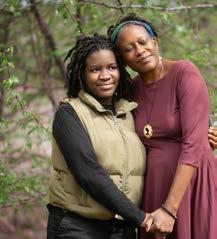

By Reginald James
Growing up in the South, music has always been inextricably woven into the fabric of my community’s story.
This is why Music Moves, a Northwest Arkansas-based platform dedicated to sharing this experience through education and performances, resonates deeply with me. My journey with music began early—I started playing for Sunday school at the age of 5 and soon found myself accompanying the adult choir by the age of 9 or 10. This lifelong involvement has allowed me to appreciate the expressive language of music and witness its transformative power firsthand.
Music Moves was founded to highlight the vital contributions of Black Americans to the cultural and historical tapestry of our nation, particularly through music. The Black experience in America, intricately intertwined with its music, offers a dynamic and profound narrative that has shaped ideologies and identities throughout history. By studying Black music, we gain invaluable insights into American history, sociology, politics, and identity, fostering a deeper understanding of our collective heritage.
It is crucial that everyone grasp the context and significance of Black music contributions. Recognizing the origins of various music forms within the Black diaspora underscores the inherent value and influence of Black individuals on American culture. When we acknowledge and celebrate these contributions, we combat the dehumanization and erasure that have plagued Black communities for generations.
In 2020, against the backdrop of the pandemic, Music Moves sought to make a tangible impact and support educators struggling to engage students in the classroom. Partnering with Dr. Jeffrey Allen Murdock of the University of Arkansas, we developed a curriculum focused on Black music education. The response was overwhelmingly positive, with student engagement reaching nearly 100% in classrooms where the curriculum was implemented. This initiative continues to evolve, with ongoing feedback from teachers guiding its development.
The correlation between arts engagement and academic achievement is welldocumented, with studies showing that students immersed in the arts tend to perform better on standardized tests. Supporting initiatives like Music Moves not only enriches educational experiences but also fosters conversations that promote understanding and unity.
In essence, Music Moves serves as a catalyst for dialogue and appreciation, bridging cultural divides and challenging misconceptions. Through its efforts, we seek to illuminate the resilience, creativity, and cultural significance of African Americans, shaping not only the nation’s musical landscape but also its societal framework.
Reginald James i s the president of Music Moves. A graduate of the University of Arkansas with a B.S. in computer science and mathematics, he holds an M.S. in education from Bethel College and is currently enrolled in the UA’s Black Sacred Music program in pursuit of a Master of Music degree.

Because what I know without a doubt is that musicBlack musicmoves people.

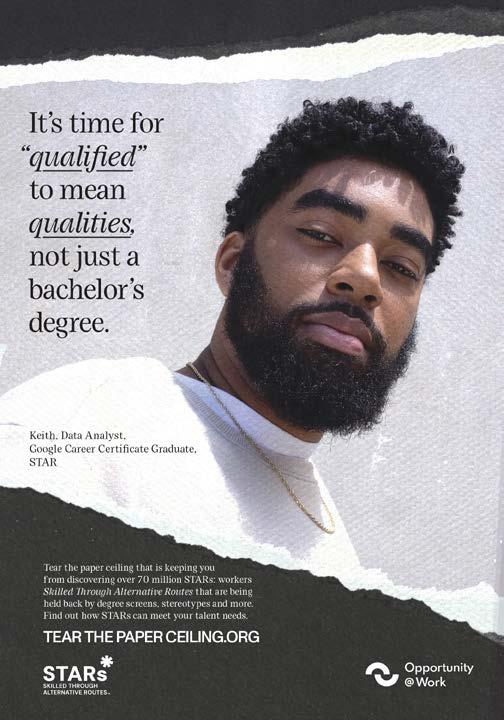
1918-2000

BY STEPHANIE BASS JACKSON
Dorothy M. Hoover’s groundbreaking contributions to science and aviation is another testament to the strength of Black women.
Hoover’s brilliance became the foundation of a life dedicated to discovery, despite overwhelming racism and gender inequality. Perhaps it was her proximity to oppression that fueled her determination to blaze trails—her grandparents were enslaved.
Because of her research and development of the “thin sweptback tapered wing,” modern flight was revolutionized.
She was the first, many times over, reaching higher heights as she excelled in her career as a mathematician and researcher. Yet, her story remained mostly unknown until a brief mention in the widely-acclaimed book, “Hidden Figures: The American Dream and the Untold Story of the Black Women Who Helped Win the Space Race.” Hoover’s legacy endures through a Congressional Gold Medal, a scholarship in her name at the University of Arkansas—HopeTexarkana, and her induction into the Arkansas Women’s Hall of Fame.